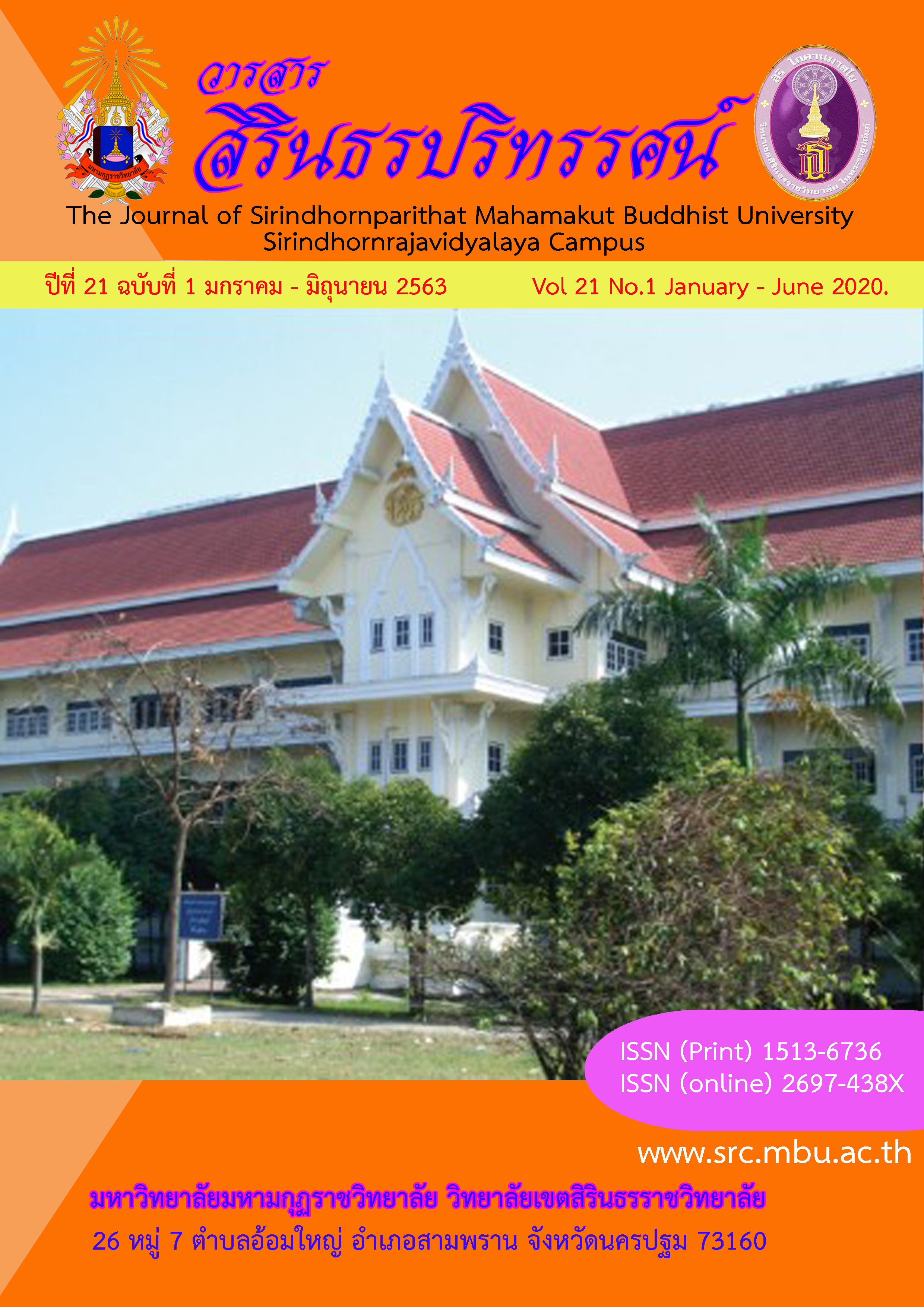The Role of Cultivating Morality of Monk Teachers the Dhamma in Schools Affecting Modify Unwanted Behaviors of Adolescents
Keywords:
Role, Cultivating morality, Unwanted behaviors, Monk teachers the Dhamma in schools, AdolescentsAbstract
The objectives of this research were as follows: (1) to study the relationship status of adolescents causing unwanted behavior, (2) to study the qualities of monk teachers the Dhamma in schools, (3) to study the role of cultivating morality of monk teachers the Dhamma in schools affecting modify unwanted behaviors of adolescents, (4) to create experiments and evaluate the efficacy, model of cultivating morality of monk teachers the Dhamma in schools affecting modify unwanted behaviors of adolescents, and (5) to prepare a guide to cultivating morality of monk teachers the Dhamma in schools affecting modify unwanted behaviors of adolescents. This research was mixed both quantitative and qualitative methods. The sample group was the 113 people who were monk teachers the Dhamma in schools under the responsibility of Mahamakut Buddhist University, Sirindhornvidyalaya Campus, Nakhon Pathom Province, including in-depth interviews with key informants 5 people. The tools were questionnaires and structured in-depth interviews. The statistics used were frequency, percentage, mean, standard deviation, and correlation coefficient. The results of research were found that (1) the relationship status of adolescents causing unwanted behavior had on a high level in 3 aspects; social and cultural, Friends and family. (2) The qualities of monk teachers the Dhamma in schools had on a high level in 3 aspects; behavior, Ideology, knowledge, ability and experience. (3) The role of cultivating morality of monk teachers the Dhamma in schools affecting modify unwanted behaviors of adolescents had on a moderate level in 3 aspects; training, supporting creative activities, coordination with related agencies. The education had on a high level. (4) The results of hypothesis testing were found that the relationship status of adolescents and the qualities of monk teachers the Dhamma in schools, and the role of cultivating morality of monk teachers the Dhamma in schools affecting modify unwanted behaviors of adolescents, were positively correlated significantly. Statistically significant at .05 level. (5) The morality model of moral ministry in schools that affect adolescent behavior modification were SCOTT MODEL; Support creative activities, Coordinate with relevant agencies, Teaching, Train, and (6) the guide to cultivating morality of monk teachers the Dhamma in schools affecting modify unwanted behaviors of adolescents; Background of the model, Elements of the model, Activities 4 and Jataka 7.
References
การศาสนา, กรม. (2555). คู่มือการดำเนินงานตามโครงการครูพระสอนศีลธรรมในโรงเรียน, กรุงเทพ: คุรุสภา.
ชูศรี วงศ์รัตนะ. (2541). เทคนิคการใช้สถิติเพื่อการวิจัย. พิมพ์ครั้งที่ 7. กรุงเทพฯ : เทพเนรมิต.
ธานินทร์ ศิลป์จารุ, รองศาสตราจารย์. (2551). การวิจัยและวิเคราะห์ข้อมูลทางสถิติด้วย SPSS. พิมพ์ครั้งที่ 9. กรุงเทพฯ: บิสซิเนสอาร์แอนด์ดี.
ธีระศักดิ์ อุ่นอารมณ์เลิศ. (2549). เครื่องมือวิจัยทางการศึกษา : การสร้างและการพัฒนา. นครปฐม: ภาควิชาพื้นฐานทางการศึกษา คณะศึกษาศาสตร์ มหาวิทยาลัยศิลปากร.
ประสิทธิวรการ (ณรงค์ ธมฺมสุนฺทโร), พระครู. (2555). การศึกษาความคาดหวังต่อบทบาทของพระสงฆ์ในการป้องกันและแก้ไขปัญหาพฤติกรรมที่ไม่พึงประสงค์ของเยาวชนกรณีศึกษา อำเภอลอง จังหวัดแพร่. วิทยานิพนธ์พุทธศาสตรมหาบัณฑิต. บัณฑิตวิทยาลัย: มหาวิทยาลัยมหาจุฬาลงกรณราชวิทยาลัย.
ระพิณ ชูชื่น. (2533). การศึกษาบทบาทของพระสงฆ์ในการส่งเสริมจริยธรรมของนักเรียนในโรงเรียนประถมศึกษาสังกัดกรุงเทพมหานคร. วิทยานิพนธ์ครุศาสตรมหาบัณฑิต. บัณฑิตวิทยาลัย: จุฬาลงกรณ์มหาวิทยาลัย.
ศึกษาธิการ, กระทรวง. (2549). โครงการครูพระสอนศีลธรรมในโรงเรียนในพื้นที่เขตตรวจราชการที่ 6 และ 7 ตามนโยบายของกระทรวงศึกษาธิการ. กรุงเทพฯ: คุรุสภา.
“สถิติารตั้งครรภ์ก่อนวัยอันควร”, 12 กุมภาพันธ์ 2557,
<http://www.naewna.com/local/90108> (สืบค้นข้อมูลเมื่อวันที่ 7 มิถุนายน 2557)
<http://mbukruphra.com/plugin.php?id=aiview_dzx:pages&do=contact> (สืบค้นข้อมูลเมื่อวันที่ 6 ตุลาคม 2558)
Downloads
Published
Issue
Section
License
บทความที่ได้รับการตีพิมพ์เป็นลิขสิทธิ์ของ มหาวิทยาลัยมหามกุฏราชวิทยาลัย วิทยาเขตสิรินธรราชวิทยาลัย
ข้อความที่ปรากฏในบทความแต่ละเรื่องในวารสารวิชาการเล่มนี้เป็นความคิดเห็นส่วนตัวของผู้เขียนแต่ละท่านไม่เกี่ยวข้องกับหาวิทยาลัยมหามกุฏราชวิทยาลัย วิทยาเขตสิรินธรราชวิทยาลัย และคณาจารย์ท่านอื่นๆในมหาวิทยาลัยฯ แต่อย่างใด ความรับผิดชอบองค์ประกอบทั้งหมดของบทความแต่ละเรื่องเป็นของผู้เขียนแต่ละท่าน หากมีความผิดพลาดใดๆ ผู้เขียนแต่ละท่านจะรับผิดชอบบทความของตนเองแต่ผู้เดียว




